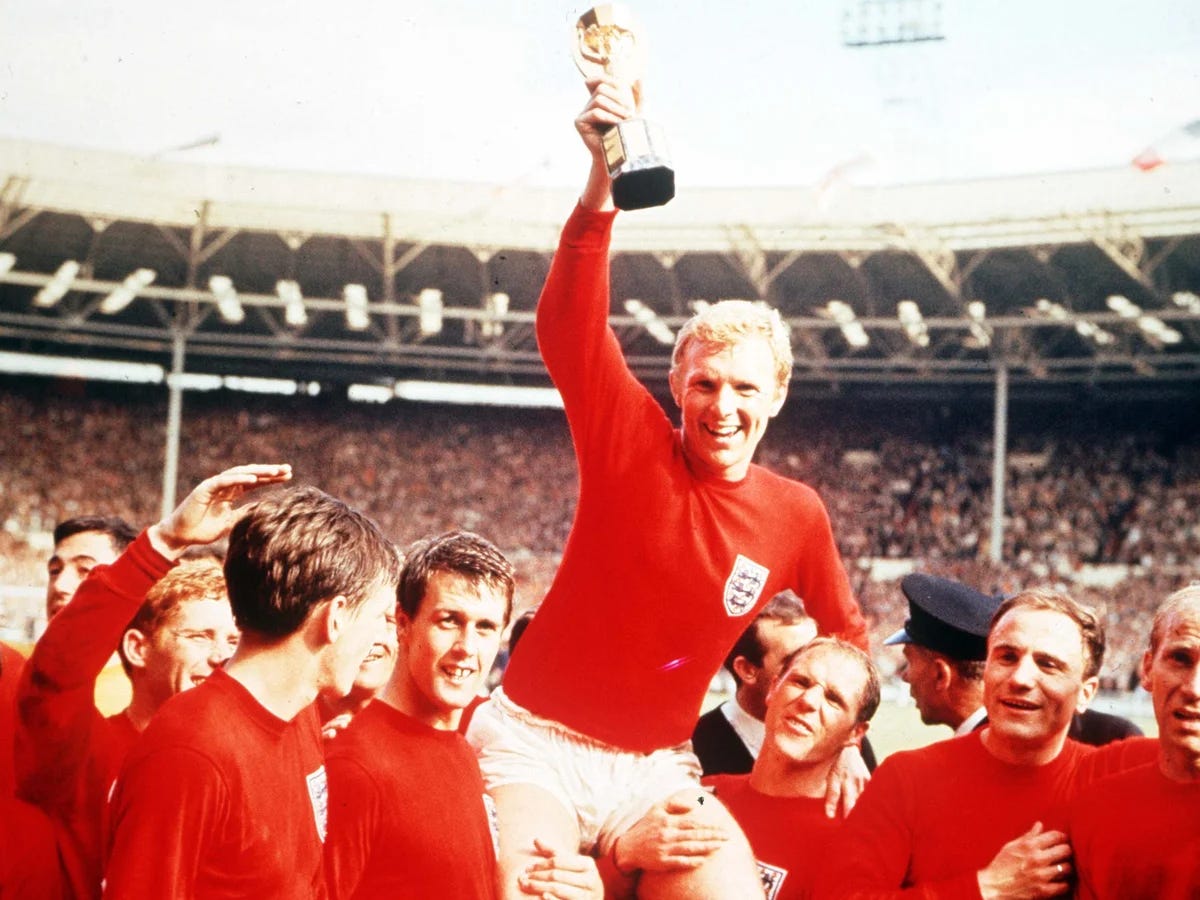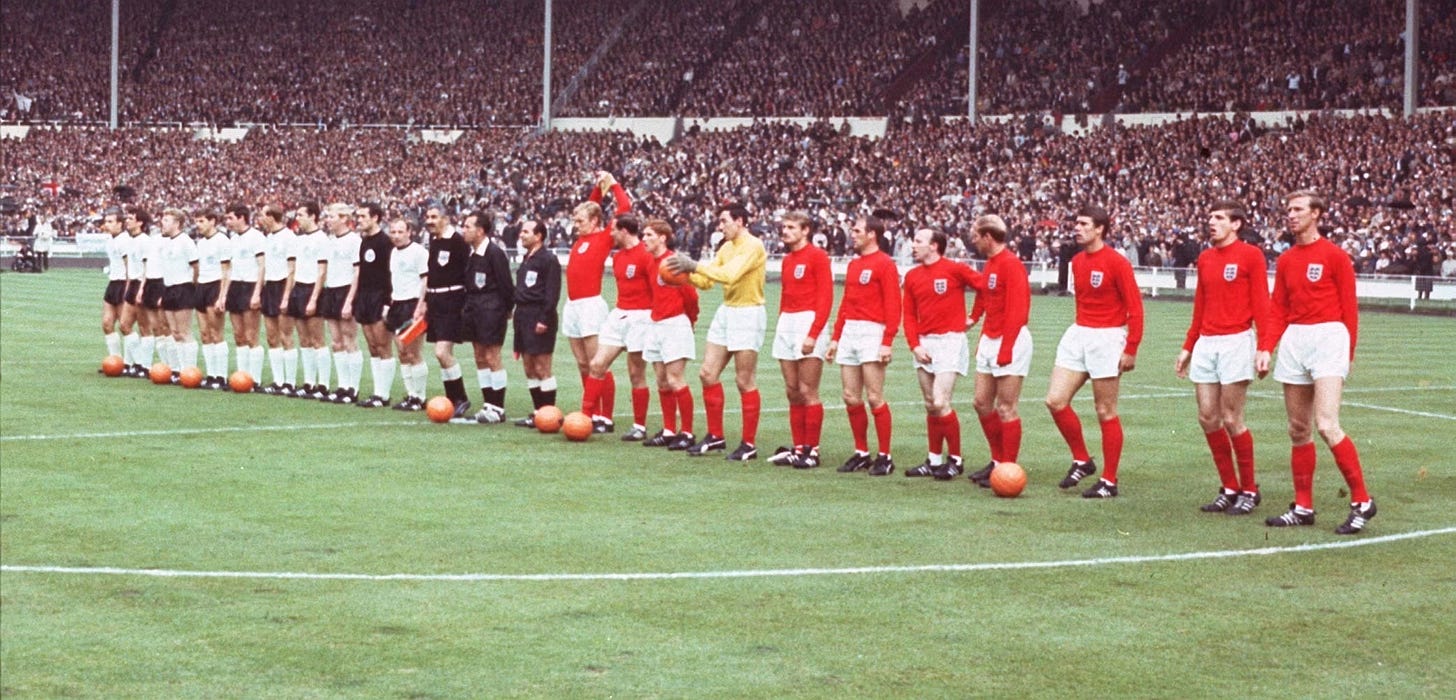On This Day, 1966: England's Glory Sealed at Wembley
How Alf Ramsay’s gamble and Bobby Moore’s poise delivered a once in a lifetime triumph for the home of football
A Nation Demands, a Captain Delivers
On this day, 30th July 1966, England won the FIFA World Cup for the first and, so far, only time. But as with all great triumphs, the story behind it is not clean, nor is it straightforward. It is a tale forged in scandal, scepticism, personal grit, and a manager’s refusal to bend under the weight of history.
The scoreboard at Wembley reads 4-2 after extra time. England are champions of the world. And yet, looking back, it is clear that the scoreline barely scratches the surface of the pressures, decisions, and turmoil that led to this singular moment in British sporting history.
I was not born until 1981, but like so many who love the game and live for history, the tale of 1966 has been passed down like family folklore. In recent days, I revisited the story in full, and one single opinion emerged, shaped by everything I have read, watched, and listened to: this was not a moment of destiny, but one of management. Alf Ramsay didn’t stumble into greatness, he dragged the nation there.
Ramsay’s England Was Built on Belief, Not Romance
We often look back on the past with sepia-tinted fondness, assuming that England’s status as football’s birthplace somehow meant they were always likely to win the 1966 World Cup. But in reality, Alf Ramsay’s side was under immense pressure and scrutiny long before a ball was kicked.
Just nine months before the tournament, England lost at home to Austria. Wembley, the home of football, echoed not with support, but with boos and chants of “you don’t know what you’re doing.” The press wanted Ramsay out, and faith in the national side was on the floor.
It would have been easy for Ramsay to crumble. But instead, he doubled down on discipline and belief in his tactical vision. Ramsay’s “wingless wonders” system abandoned traditional wingers in favour of fluid, hard working midfielders. It was not designed to thrill. It was designed to win.
That belief was tested again when England’s captain, Bobby Moore, became ineligible to play. Moore had let his West Ham contract expire and under FA rules, he couldn’t represent his country without being registered to a professional club. Ramsay could have panicked, could have dropped him. But instead, he orchestrated a late deal that saw Moore sign a one month extension just to be eligible for the tournament. The deal was struck just days before kick-off.
That sort of manoeuvring takes nerve, and it highlights what set Ramsay apart. He didn’t see problems, he saw puzzles that needed solving. And in Moore, he had the right man to execute his plan.
Bobby Moore Was the Calm Within the Chaos
Much is said about Bobby Moore’s leadership and ability, but revisiting the tournament reveals the true scale of his influence. Moore was not just the captain. He was the glue that held everything together when chaos beckoned.
Take the infamous quarter-final against Argentina. In a match marred by fouls, protests, and a full scale meltdown from the South Americans, Moore remained level headed and led by example. He didn’t allow his teammates to be dragged into the drama. When the game threatened to descend into farce, Moore reminded England who they were and why they were there.
Then came the final. In extra time, with legs heavy and nerves tighter than a Wembley snare drum, Moore made the defining decision. Instead of hoofing the ball into the stands to kill time, he saw Jeff Hurst making a run. With the calmness of a chess grandmaster, he picked him out. Hurst did the rest.
Without Moore’s brain and Ramsay’s trust in it, England might have won that game 3-2. But with it, they sealed it 4-2 and entered footballing folklore.
The Forgotten Farce of the Missing Trophy
Amongst the tactical tales and on pitch drama, one detail is often left on the cutting room floor, the Jules Rimet Trophy was stolen in the months leading up to the tournament. Yes, really.
In March 1966, the World Cup was on public display in London when thieves broke in and made off with it. Panic set in. Ransom notes arrived. Scotland must have laughed themselves hoarse. But miraculously, the trophy was discovered a week later under a hedge in South London by a dog named Pickles.
The absurdity of the moment is almost too British to be believed. A dog saved the nation's blushes. It was farcical, yes, but symbolic too. In 1966, nothing about England’s path to glory was straightforward. Even the silverware tried to go missing.
Legacy and the Weight of History
What followed in the years after 1966 is arguably even more fascinating. That single win, that solitary lift of the Jules Rimet, created a burden. Every England team since has lived in its shadow. Every manager has been measured against Alf Ramsay. Every captain, no matter how talented, has been forced into comparisons with Bobby Moore.
And yet, not one has matched them. Not one has conquered the world again in England colours. For a nation so obsessed with football, one golden day remains their entire World Cup history. A sobering thought.
Still, on this day each year, there is a flicker of magic. For those who remember it, and for those of us who came after, 30th July 1966 is something to hold onto. It is a reminder that history is not always written by the favourites or delivered through dominance. Sometimes, it is carved out through pure will, by managers who refuse to fold and captains who carry nations on tired legs.
As I reflect on it now, one thought returns above all others. England did not win the World Cup because they were the home of football. They won it because they earned it.



